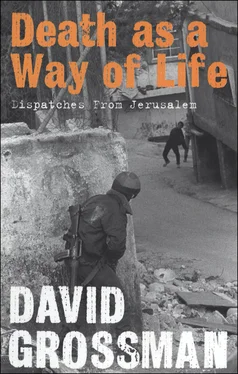David Grossman - Death as a Way of Life
Здесь есть возможность читать онлайн «David Grossman - Death as a Way of Life» весь текст электронной книги совершенно бесплатно (целиком полную версию без сокращений). В некоторых случаях можно слушать аудио, скачать через торрент в формате fb2 и присутствует краткое содержание. Год выпуска: 2013, Издательство: Bloomsbury Publishing, Жанр: Прочая документальная литература, на английском языке. Описание произведения, (предисловие) а так же отзывы посетителей доступны на портале библиотеки ЛибКат.
- Название:Death as a Way of Life
- Автор:
- Издательство:Bloomsbury Publishing
- Жанр:
- Год:2013
- ISBN:нет данных
- Рейтинг книги:5 / 5. Голосов: 1
-
Избранное:Добавить в избранное
- Отзывы:
-
Ваша оценка:
- 100
- 1
- 2
- 3
- 4
- 5
Death as a Way of Life: краткое содержание, описание и аннотация
Предлагаем к чтению аннотацию, описание, краткое содержание или предисловие (зависит от того, что написал сам автор книги «Death as a Way of Life»). Если вы не нашли необходимую информацию о книге — напишите в комментариях, мы постараемся отыскать её.
Death as a Way of Life — читать онлайн бесплатно полную книгу (весь текст) целиком
Ниже представлен текст книги, разбитый по страницам. Система сохранения места последней прочитанной страницы, позволяет с удобством читать онлайн бесплатно книгу «Death as a Way of Life», без необходимости каждый раз заново искать на чём Вы остановились. Поставьте закладку, и сможете в любой момент перейти на страницу, на которой закончили чтение.
Интервал:
Закладка:
Arafat will not, apparently, get what he wants, which is to draw the Arab countries into the conflict. They fear, no less than Israel, the internal unrest that the Israeli-Palestinian conflict causes, and fear even more the Islamic religious extremism that Arafat encourages and that is liable to harm them from within. The world will, apparently, continue to abandon Israel and the Palestinians to kill each other.
More seriously, Arafat’s gambits, the encouragement he gives to the suicide bombers, his grotesque hope, as he recently stated, to himself be “a suicide bomber, a martyr, on the way to Jerusalem,” only pushes the establishment of a Palestinian state further into the distance.
Evil things are happening to both peoples. Fear causes no less damage to the soul than explosives cause to the body. Israeli society is becoming more violent, aggressive, and racist, and less democratic. Palestinian society is undergoing an even more dangerous process. A society that becomes accustomed to sending its young men and women on suicide operations aimed at murdering innocent civilians, a society that encourages such actions and glorifies their perpetrators, will pay a price in the future. Its coin will be their attitude toward life itself, life as an inalienable sacred value. It will also be paid in a more practical way — the minute the possibility of such a horrifying action is formulating in the consciousness of a nation, it will not disappear. It will rear its head again in the people’s internal affairs. It is not at all surprising that moderate Palestinians are no less alarmed by the suicide bombers than Israelis are. They know the bitter truth — the weapon of suicide, which has proved itself so effective against the Israelis, is liable to be used against them as well, when the Palestinians have a state and commence their internecine struggles over the character and image of that state.
That’s the way things are right now. It’s a situation of despair and disintegration. How can we get out of it? Palestinian terrorist attacks will, unfortunately, continue for a long time to come. But if there is also, concurrently, a move toward peace, a process of concessions, of ending the occupation, of conciliation and recognition of the suffering incurred by the other side, there is room for the hope that the Palestinian public’s support for terror will decline, and the Israeli public’s confidence in a peaceful resolution of the conflict will grow. Is there a chance that this might happen? Every thinking person realizes that Arafat and Sharon are incapable of creating this opportunity. What remains? To live through this nightmare to its end, to go from funeral to funeral, and to try to survive each passing moment. Thoughts of peace, of mutual understanding, of coexistence between the two peoples now sound like the last signals of life from a ship that has already sunk.
This War Cannot Be Won
June 2002
When the bus exploded in the morning rush hour in southern Jerusalem, the sound was heard miles away in other parts of the city. Most of the victims were residents of the neighborhood of Gilo, often targeted by Palestinian snipers. A few of the dead and the wounded were Arab Israeli college students. Arafat made a statement to the Palestinian people the next day, demanding a halt to attacks on Israeli civilians, because such attacks give the Israeli government “the excuse to reoccupy our land.”
Another victory for madness: A moment before President Bush was to make a speech declaring his support for a Palestinian state, a Palestinian suicide-murderer of the Hamas faction blew himself up on a bus in Jerusalem. He killed nineteen civilians and wounded seventy, including children on their way to school. Black plastic body bags were laid out in a row on the sidewalk, one next to the other.
This row of bodies also postponed significantly the Palestinians’ chances of attaining their own state. Despite this, according to a survey published yesterday in the Palestinian Authority, 80 percent of the Palestinian public supports continued terrorist attacks against Israelis. If that’s the case, we must conclude that the Palestinians are now doing everything necessary to ensure that they will never have their own country.
At the same time, the Israeli government is being pushed into a corner. Shackled to its aggressive, mechanical, one-dimensional way of thinking, it immediately declares an escalated response. From now on, the government declares, the Israeli Army will reoccupy areas of the Palestinian Authority following every attack on Israel. Only this time, the army will not withdraw quickly — it “will instead remain in them until terrorism ceases.”
Since terrorism won’t come to a halt, certainly not as long as there is no political settlement granting the Palestinians an independent state, it is clear that the Israeli government has decided to reconquer the entire area of the Palestinian Authority, in order to ensure that terrorism will continue.
Why is Hamas so eager to harm the interests of the Palestinians as a whole? Because Hamas fears the reforms that Arafat will soon be compelled to institute, reforms that will restrict Hamas’s terrorist activities. Hamas is also concerned that the positions of Egypt, Jordan, and Saudi Arabia on the need to fight terrorism are drawing closer to those of the United States and Israel. Hamas’s immediate goal is to induce Israel to attack the Palestinian Authority, perhaps even reoccupy its territories, to force these relatively moderate Arab states to retreat into their previous extremist positions.
So why is the Israeli government — under Ariel Sharon’s leadership — playing into Hamas’s hands?
Because it doesn’t believe that it has anyone to negotiate with on the Palestinian side, and because it includes factions that oppose any real compromise. But mostly because the Israeli government is at a loss, confused, and desperate.
Israel is so much at a loss that yesterday a senior cabinet minister proposed that Israel, instead of surrounding itself with a protective wall and fences, surround every Palestinian village and city with fences, to isolate them one from the other.
Israel is so discouraged today that the idea of expelling the Palestinians from the areas of the Palestinian Authority, and expelling Israel’s million Palestinian citizens, is gaining support and legitimacy in public opinion and at the cabinet table. Yesterday, at the entrance to Jerusalem, demonstrators who support such a transfer (the euphemistic term for expulsion and deportation) carried this banner: TRANSFER: THE ONLY WAY TO PEACE!
In other words, not dialogue and compromise and mutual recognition and a consensual border and a cessation of terrorism as the way to peace. No, the way to the much-desired peace and tranquillity is to expel a few million more Palestinians!
One gets dizzy listening to such unfounded claims, from seeing the horrors that come hard on the heels of the last, creating a surrealistic continuum in which a madman’s logic rules. If we follow each side’s line of thinking a little further, we’ll easily perceive how we will soon be living — in an endless jumble of murders and expulsions and reoccupations and strategic mega-attacks, perhaps even nuclear terrorism, the destabilization of the moderate Arab states, perhaps even an all-out war whose outcome no one can predict. It feels like a nightmare, and maybe only a historian gazing back from the future will be able to explain the hypnotic effect of the nightmare we are striding into with eyes wide open. Both sides are doing everything in their power, each in its turn, to ensure that it all comes true.
Three weeks ago I went to London to participate in a unique encounter organized by the British newspaper The Guardian. Israeli and Palestinian supporters of peace spent three days conferring with the leaders of the formerly warring factions of Northern Ireland. The Irish, Catholics and Protestants who had been murdering each other just four years ago, sat next to each other and spoke the language of peace, and expressed their grave concern that the conflict might break out again. We, the Israelis and Palestinians, listened to them, with much yearning and envy. At one point, an Israeli asked, How did you do it? How did you manage to extricate yourselves from hundreds of years of violence and hatred and put yourselves on the track of dialogue? When did you understand that there was no other way?
Читать дальшеИнтервал:
Закладка:
Похожие книги на «Death as a Way of Life»
Представляем Вашему вниманию похожие книги на «Death as a Way of Life» списком для выбора. Мы отобрали схожую по названию и смыслу литературу в надежде предоставить читателям больше вариантов отыскать новые, интересные, ещё непрочитанные произведения.
Обсуждение, отзывы о книге «Death as a Way of Life» и просто собственные мнения читателей. Оставьте ваши комментарии, напишите, что Вы думаете о произведении, его смысле или главных героях. Укажите что конкретно понравилось, а что нет, и почему Вы так считаете.












